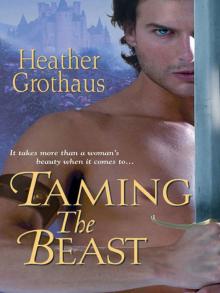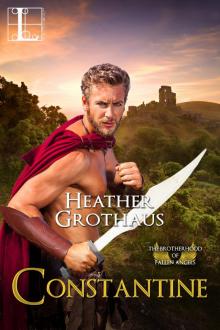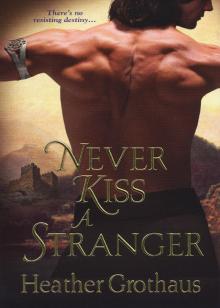- Home
- Heather Grothaus
Constantine Page 12
Constantine Read online
Page 12
“Patrice mentioned several times that everyone thought you’d marry royalty,” Constantine spoke the memory aloud before he could think better of it.
Theodora huffed a mirthless laugh. “And look at me now. I’m supposedly dead. Everything has been taken from me: my health, my beauty, my fortune, my family, my home. My son. Even the basest slave has more to boast of than I. Theodora Rosemont, who had every freedom, is now little more than a ghost. A hated ghost.”
Her tone caused Constantine’s defenses to rise. “Was I supposed to defend you to my loyal man, who served my family and knew me well?”
Her eyebrows raised. “I don’t know. Were you?” she challenged him.
“You’re twisting this into some lack of chivalry or honor on my part,” he accused her. “Before coming back to Benningsgate, I hadn’t seen you since you were a girl in short skirts. You came to my wedding with your father. You’d never even met my son.”
“I’ve said nothing of chivalry or honor,” she replied coolly and then rose. “And to my knowledge, after your wedding to Lady Patrice, you were not in residence at Benningsgate for a length of time such as would allow a visit from my father or anyone else. So perhaps it is your own conscience you hear berating you rather than me. Are you ready?”
He was frowning in earnest now. He had come back to the ruin from the river intent on doing that which he hadn’t known was still necessary, and he didn’t need Theodora Rosemont trailing after him like the sickly, pathetic waif she was, her big eyes holding him responsible for all the wrongs that had perhaps been done to her, even as he wanted to denounce her for his own trials.
“Ready for what?” he snapped.
“For me to show you through to the hall,” she said, looking into his eyes. “That’s where you want to go, isn’t it?”
Constantine’s stomach became an icy pit. “You know a way?”
“I could see your reaction to the loyal Jeremy’s slip that no one had been able to reach Lady Patrice or your son after the stones had cooled enough to attempt a retrieval. You thought they had received a great ceremony befitting the noble house of Chase, did you not?”
Constantine could only stare at her and nod his head once, sharply.
Theodora Rosemont shook her own head to the negative, and he thought he saw a spark of anger in her dark eyes. “Patrice was marked as a traitor in league with you—as hiding one of your co-conspirators within Benningsgate and refusing to divulge your whereabouts. The king ordered the ruin abandoned, the village emptied, until such evidence as to your guilt or innocence could be provided.”
Constantine continued to stare at her until his vision blurred and he was forced to look away. His rage was so great that he felt as though his mind and body had been enveloped in a white-hot haze, buffering him from the earth, burning him inside this fiery cocoon.
“Show me,” he rasped.
She turned without further word and began walking toward the tilted stair that led to the wall walk and Constantine followed her, his heart screaming in his chest, his footfalls so heavy he thought it a wonder they didn’t leave chasms in the twisted overgrowth of the ward.
They gained the walk and Theodora went to the most intact wall of the keep. Hugging it close, she stepped on to the stones that had fallen against its south side, forming a sort of bridge. Constantine thought they looked more than a little loose, but none of them so much as shifted under Theodora’s slight weight. If they did, she would tumble down into the ward atop the pile that had already met that same fate long ago, becoming buried herself.
As if she heard the unspoken warning, she turned her face back toward him. “Step lightly.” And then she was gone around the far side of the charred remains.
Constantine followed, the stones beneath his boots sighing and groaning, whispering to one another as he made his careful way after the woman. Perspiration sprang out along his forehead, both from the exertion of keeping his footing and the nightmare into which he was heading. Part of his heart was screaming at him to stop, go back. He didn’t want to see.
But he reached the hidden corner of the keep that appeared from below to be collapsed. It largely was, the wall cracked in a long seam along the stones of a doorway lintel and shoved back as a whole, revealing a partially collapsed gap inside, filled with stone and what appeared to be a long, oiled piece of finely turned wood.
“I’m not going in,” she said, drawing his agitated attention.
“I didn’t invite you,” he snapped.
Her pale face regarded him for a long moment. “If it collapses around you . . .”
“Lucky for you,” Constantine said.
“I didn’t do this, Lord Gerard,” Theodora said, and the sadness was back in her eyes once more. “I’m sorry you think me your enemy. I’m not.” She paused. “Be careful.”
Then Theodora Rosemont braced her hands on the collapsed walls and moved around him, back along the treacherous path of the fallen stones to leave him to his miserable discoveries or his painful end, whichever he might be more determined to find.
Constantine lowered himself carefully into the chasm, reaching one booted foot upon the conspicuous piece of hewn wood. It wobbled and flipped under his weight, obviously no good foothold, and he spilled to his knees, sliding sideways into the wall with a shout of alarm. But his fall was arrested and he turned over onto his stomach to take hold of the piece of wood that had caused his slip.
It was the crucifix from the oratory, the crumbly remains of a wreath of long-dead flowers still affixed with faded ribbon around the scarred head of Christ. Flowers Benningsgate’s priest would have laid. Or perhaps even the lady of the keep, Patrice.
But how did the crucifix come to be . . .
Constantine glanced at the triangle of daylight beyond the pile of rubble, thinking of the woman who had come upon this place so ill and weak; the only person who had been determined enough to attempt to enter the place his wife and son had lost their lives through the cruel evilness of the man she had married. And even as fragile and unwell as she had been, Theodora Rosemont had wrested the crucifix from the wall of the oratory and somehow managed to bring it over the treacherous path through the ruin to lay it at the threshold of the place where his family had been left without ceremony. To try as best she could to make a proper tomb for his little boy. Spoiled, horrid Theodora Rosemont, Glayer Felsteppe’s wife.
She’d been the only one who cared.
Constantine swallowed down the thorny lump in his throat and crawled on through the black chasm.
Chapter 12
Constantine would have vowed familiarity with every twist and turn within Benningsgate’s keep. But being trapped in the narrow gap of the collapsed stairwell was like trying to navigate a foreign shore at night. He flipped over onto his back to slide through a particularly shallow opening between slabs of charred red stone, and as the solidness of the masses pressed against both his chest and his back, for a moment he had the panicked sense that he didn’t know up from down. If the rocks shifted the tiniest bit from his movements, he would be killed.
Or perhaps not killed, only pinned under tons of rock, the breath squeezed out of him little by little for hours or maybe days. Imprisoned, just as in the dark cell in Damascus.
The thought caused him to freeze in his movements, as if already trapped, and he could feel the perspiration causing his tunic to stick to his skin as surely as if he’d walked into yonder river. That idea in turn called to mind Theodora’s dead father, the drowned Lord Rosemont.
But he shook himself. Christian was inside the ruin somewhere. He and Patrice lying alone in such a sad, desolate place for years without him. Still waiting for him. He could not fail them again. And so he shoved down the panic when his next deep breath was arrested halfway, and used the anxiety to fuel his motion through the gap.
He turned his head to look up and ahead of his path and saw a line of daylight. Pushing once more with only his toes in the narrow place, Constantine’s head in
ched from the crevice to emerge in open air, the sky suddenly blue above him through the gauzy curtain of high, sheer cloud. Black darts swooped and circled through the column of charred stone, diving diagonally to and from their secret nests tucked practically inside the injuries of the keep.
Constantine craned his neck to look beneath himself and saw the square of rubble that had settled into the foundation of the tower keep, perhaps fifteen feet below his head. Wriggling to the side, he withdrew first one arm, then the other, from the crevice and reached above to find handholds, mindful of the fact that any downward pressure he exerted on the detritus in the doorway could cause it to collapse fully on his lower half. He pulled tentatively at first, trying to allow most of his weight to remain on his back while he slithered from the gap. Once he could slide his right knee out and gain a foothold with his boot, he drew a deep breath, gripped the stones with his fingers, and stood in one sliding movement.
The stones held, even though he did hear the crumbling, skittering sounds of pebbles running mazelike around him. He looked down the steep wall to the rubble below—too far yet to jump. He’d break his leg at the very least if he landed upon something solid. Worse, if the debris shifted. Constantine turned his head to look down his right side and saw the jagged, black remains of a wooden beam perhaps two feet below and one foot farther to the right than his boot. It was just what he needed to move in a zigzag fashion to the bottom of the doorway. He slid both feet as far to the right as his perch would allow, and then, hanging on with only his left hand, he stepped out and down with a quick intake of breath.
He lay flat against the stones like a spider, balancing awkwardly on the jagged end of wood that was already crumbling, collapsing like a sponge beneath his sole. He looked back to the left at the narrow ledge of masonry threshold just deep enough for his fingers. Constantine closed his eyes for a moment, the side of his face against the cool, damp stones. Then he looked once more to the ledge as his left arm slid down the shallow depressions in hitches. He was only perhaps a foot from reaching it now. He took a deep breath and let his body fall.
His left hand slipped off the threshold and his arm swung away. He couldn’t help his shout of alarm as his right hand arrested his fall, and he quickly brought his left hand up to cease his wild swinging over the floor. He dared to look down again and guessed that the soles of his boots were perhaps ten feet above the rubble now, and so he inched to the left, the toes of his boots scrabbling against the wall for purchase until he was suspended over a wide-looking, slanted piece of rock. Then he let go.
The drop was farther than it had appeared, and his right knee twisted before his legs buckled to the unevenly resting stone slab. His shout of pain echoed up in the jagged column of the ruin, startling the birds from their hidden nests and sending their panicked tweets bouncing inside the keep. Constantine rolled to his back with a groan, bending his right leg and raising his head as his hands went to his knee. He hissed as he extended his foot along the stone and then drew it back again; he didn’t think it was broken, just turned. And so he scooted back to a sitting position, his hands braced to either side of him and looked around.
He’d never thought to be in this hall again. Especially after he’d heard of the fire that had destroyed Benningsgate. But here he was, the only person to have entered this place since the night Glayer Felsteppe murdered Patrice and Christian. He was finally where he should have been these many, many years.
The rubble was deep—Constantine knew from the height of the lone window above him that the debris had filled at the very least the first floor chamber abutting the gatehouse below the slope of the ground outside the wall. The doorway he’d slid through into the ruin had belonged to the antechamber leading to the great hall itself and the corridor of apartments belonging to the family. He’d dropped somewhere midway into a receiving room, which led to the lower corridor in the bottom half of the wall. Had the way been clear—and the west wall still intact—Constantine could have trod the entire length of the passage beneath the wall walk to the oratory.
Had Theodora Rosemont returned there after leaving him to his macabre duty?
Constantine looked up again to the narrow opening in the wall some thirty feet above his head—the window that had decorated his great hall. It held no colored glass now, only the remnants of last summer’s vines. Then his gaze fell back down to the rolling field of jagged stone before him.
How much of the keep walls lay atop the layer of the hall floor?
Constantine stood up, favoring his right knee, and limped across the rubble to the center of the space and turned in a slow circle, his eyes taking in the remaining walls, up to the pinnacle of the stone as it stretched toward the bright sky around the island of wreckage on which he was now marooned. Nothing slid, nothing shifted. The stones were packed in solid with their weight, baked in place by fire and the suns of summers past, solidified by rain and snow and wind. Not a speck of material that had not been chiseled from the earth could be seen. No wooden beams or floor boards, no charred furniture, no bleached scraps of tapestry.
No white bones.
“Where are you?” he whispered to the shadows crouching beneath the stones.
Was he just to leave his boy here, his wife? Could he allow them to lay where Glayer Felsteppe commanded they fall?
Constantine dropped to his left knee, stretching his right leg out before him. He picked up a stone the size of a round of bread in both his hands and hefted it there for a moment, feeling its weight as he looked around himself at the thousands more like it. He tossed the stone to the left with a huff, and it tumbled and bounced across the field of debris until it came to rest near the wall.
Then he picked up another.
* * *
Dori sat in the yard for hours, leaving her post only a handful of times to fetch a drink of water or to seek the tall weeds later to rid herself of it. She’d gained the wall walk twice, placing her hand upon the remaining wall of the keep and pausing to hold her breath and listen. She thought she’d heard a rhythmic scrape and tumble of rocks, little more than whispers of sound on the wind. But there had been no shout of alarm, no plea for help, and so she’d gone back down to her hard seat in the ward.
Likely Constantine Gerard wouldn’t have called out even had he found himself in dire straits, whether because his injuries prevented it or because he didn’t wish to be rescued. She thought he would choose instead to remain in the open-air crypt that was Benningsgate Castle. Dori didn’t know how long she would have to wait in the ward for his return.
As long as it took, she supposed.
The sun was welcome heat on her skin. It had been months since she’d been out of doors in the bright light, and her body seemed to drink it in through the pitiful thinness of her clothes. Her lips became raw and tingled under the rays and the brisk wind, but she didn’t care. Her only concern at Constantine Gerard being in the keep for hours now was that soon the sun would dip behind the ruin, washing the ward in purpling shadows and despair once more, and she would be alone, with no way of knowing if he was ever coming back.
She was surprised to see the great gray beast of a dog bounding across the threshold of the wall. And as if he had come to the ruin with the express intention of seeking Theodora, he ran straight at her, his unhinged tongue flapping from the side of his mouth, his matted hair now dry and wiry-looking over his sinuous back, apparently unbothered by the lack of attention she’d shown him earlier. Or her sincere plan to have brained the dog with his master’s own cane. She sat still while he bounded across the ward, the rotund Jeremy following at some distance, not at all fearful of being attacked by the beast now.
But she became slightly warier of Erasmus’s enthusiasm when the animal failed to slow as he galloped ever closer. Dori frowned and at last held her hand down to below her knee, snapping her fingers as she’d seen her father do with his hunting hounds when she was a little girl.
“Here now,” she called out sternly. “Mind yoursel
f and lie down if you must.”
But her eyes widened as the dog seemed to take her speaking as encouragement and increased his speed.
“No,” she called out and held her hands before her to ward off the collision that seemed imminent. She’d waited too long to rise.
Erasmus leaped at Dori in much the same manner as he had Lord Gerard, but her slight form held no leverage against the dog, who weighed more than she did, and both woman and beast went over backward on the stone with a shriek and an ecstatic whine.
The breath was knocked from her body, and even as she tried to gasp for air, her nose and mouth were covered with heavy, wet attention from the wide head before hers. She shoved at the animal, but her fists slid ineffectually off his solid muscles and sinewy limbs.
“Get . . . off!” she wheezed and then, a moment later, a blessedly cool rush of air whooshed over her as the daylight once more reached her face and Jeremy was pulling her to her feet.
Dori jerked her hands away and then bent over, bracing herself on her knees as she gasped. Once she had command of her respirations, she stood and glared at the village man and his dog, who appeared to be cowering behind his master’s back.
Jeremy held up his palms and gave her a sideways look.
“What?” Dori demanded.
“Are you going to strike me again?”
“I should!” she shouted, and then looked down at the ducking animal to give him a glare all his own while she shook out her skirts. She was fairly certain she’d heard a rip as she’d gone over backward, and there was a decided looseness about the waist of her poor underskirt. It was likely tearing free from the ties at last.
Erasmus whimpered quietly.
“He’s only happy to see you,” Jeremy informed her in a chastising tone. “Although why I can hardly say, as you’ve been naught but cross with him.”

 The Highlander's Promise
The Highlander's Promise The Laird's Vow
The Laird's Vow The Scot's Oath
The Scot's Oath Taming The Beast
Taming The Beast Never Seduce A Scoundrel
Never Seduce A Scoundrel Roman
Roman Never Love a Lord
Never Love a Lord Never Love a Lord (Foxe Sisters)
Never Love a Lord (Foxe Sisters) Valentine
Valentine Adrian
Adrian Constantine
Constantine Never Kiss A Stranger
Never Kiss A Stranger